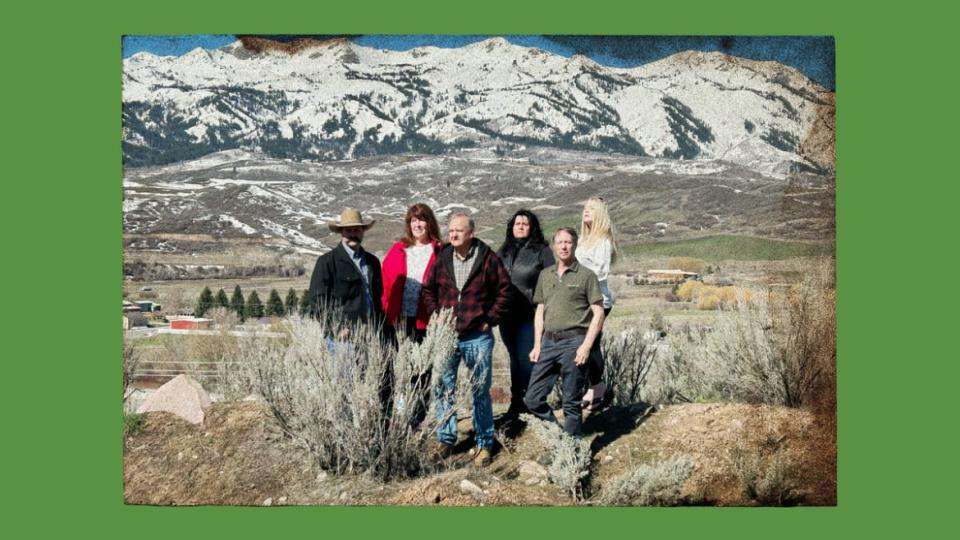Inside the Battle Royale Over a Utah Ski Resort for the Uber-Rich

A brochure for Wasatch Peaks Ranch pitches it as the perfect getaway: a pristine, snow-covered ski resort 35 minutes from Salt Lake City, with more than 5,000 acres of barely touched powder and 24 continuous peaks—the kind of place where anyone with a passion for skiing and $500,000 to spare for a membership would die to get away for a weekend.
“Enjoy your own private sanctuary, exclusive mountain club, or consider the incredible development potential,” the brochure, aimed at potential investors, boasts. “Wasatch Peaks Ranch offers an unrivaled investment opportunity in an ideal location.”
Some of the locals would beg to differ.
Over the last three and half years, residents of bucolic Morgan County, Utah, have battled the developers of Wasatch Peaks Ranch over their proposed 11,000-acre, ultra-exclusive getaway in the scenic mountains around their homes. The dispute has played out in town hall meetings and $10 million lawsuits and even reached the state Supreme Court. Court filings allege a campaign of threatening phone calls and secretive alliances by the developers.
Cindy Carter, a Morgan County resident who has opposed the development since it was proposed in 2019, said she still remembers a fateful meeting she had with developer Ed Schultz in September of that year.
“That day when he left I said, ‘Ed I want you to know we will pursue a referendum [against this],’” she told The Daily Beast. “And as he walked out my door he said, ‘I will fight you.’”

Wasatch locals who opposed the ski resort’s plan
The dispute began in earnest on Nov. 6, 2019, when five Morgan County residents showed up to the county clerk’s office to file for a referendum opposing the development of Wasatch Peaks Ranch.
A month earlier, the Morgan County Council had voted 6-1 to approve the zoning and enter into a development agreement with WPR Development Company, clearing the way for construction to begin. Whitney Croft, a seventh-generation Morgan County resident, had recently helped deliver a letter opposing the development with more than 1,000 signatures to the council. When the council voted in favor of the development anyway, she and Carter decided their only option was to petition for a public vote.
“I just didn’t think the seven county council members listened to us,” she said. “It wasn’t anything personal, we just wanted to let the people decide.” (WPR Development Company declined to comment for this story.)
Croft arrived at the clerk’s office at 4:53 p.m. that day to notarize the signatures of the other referendum sponsors: Dave Pike, a retired bus driver; Bob Bohman, a former fire marshal; Shelley Paige, a retired IT specialist, and Brandon Peterson, who works at the local Air Force Base. (Carter helped organize the referendum but was not an official sponsor.) With the 5 p.m. deadline to file fast approaching, the sponsors arrived one by one to add their names, which Croft affixed with her notary stamp.
Unbeknown to them, WPR Managing Director Ed Schultz and attorney Allison Phillips Belnap were also arriving at the courthouse—to file the final development plans.
“I think Cindy carters[sic] here,” Belnap texted Schultz upon arriving, according to text messages submitted by the sponsors in a lawsuit. “Sounds like she’s handed in an application.”
“Fuck,” Schultz responded.
“She doesn’t have it straight so let’s pray they fucked it up,” Belnap said.
According to an affidavit she filed in the referendum case, Belnap watched as Croft collected the signatures, approached the clerk, and submitted the petition. Then Belnap approached the clerk herself and told her to write down the exact time Croft had handed in the petition: 5:05 p.m.
In the days following, lawyers for WPR sent letters to the clerk’s office demanding they dismiss the petition, in part because it had been filed five minutes past the deadline. When the clerk’s office did not respond, the company filed a petition with the local district court, asking the judge to order the office to drop the application. “Wasatch Peaks had no other choice than to seek immediate relief from the Court,” WPR attorney Mark Gaylord wrote in an email to the clerk’s office, alerting them to the filing. “We stand ready, willing, and able to discuss this issue with you at your convenience.” The court dropped the petition the next day.
The whole fight could have ended right there. But this was only the beginning.

Morgan County, Utah, population 12,295, is a lush, wooded valley, surrounded by the Wasatch Mountains and bisected by the Weber River. The valley provided fertile farming grounds for the Church of Jesus Christ of Latter-Day Saints settlers who moved into the valley in 1855, and it remained a largely agricultural economy through much of the 20th century. Even today, the bulk of commercial activity is concentrated in the city of Morgan, while much of the rest of the valley is sparsely populated. Almost a third of the county is undeveloped, forested area, according to data collected by the Copernicus Programme.
Like many beautiful, naturally rich areas in the west, however, the population of Morgan County is growing—fast. Between 1900 and 2020, the county grew by about 12,000 people. In the next decade alone, it is expected to grow by 7,000. The county’s general plan, published in April 2022, acknowledges that it is struggling to maintain its “rural, small western town atmosphere,” while expanding services, providing affordable housing, and growing the economy. “Community character is important,” reads one section of the plan, summarizing the community’s feelings on growth. “[We] don’t want to become another Park City.”
Enter Wasatch Peaks Ranch. The 11,000-acre plot—a combination of public and private land, including the estates of prominent ski-area developers Dick Bass of Snowbird and Earl Holding of Snowbasin—was purchased by an anonymous group of investors in 2019 for an estimated $46 million. (One of the project owners has been revealed to be Lessing Stern, son of Deer Valley founder Edgar Stern, but the others remain undisclosed.) The deal the developers inked with the county council is the largest zoning change the county has ever seen, allowing for 750 residences, 3,000 acres of skiing, and a championship-level 18-hole golf course.
Developers have argued that the resort will be a boon to the local economy, supporting 600 jobs and nearly tripling Morgan County’s tax base from 2018 levels, according to The Salt Lake Tribune. Shultz told the paper in April that the project had already yielded $2 million in property tax revenue and has created 130 seasonal jobs.
But the developers have also made it clear that the resort is not for the citizens of Morgan County to enjoy. Modeled after the exclusive Yellowstone Club, the private ski resort in Montana with members including Bill Gates and Tom Brady, Wasatch will be accessible only to those who purchase a $500,000 membership. (More ambitious members can buy equity in the project in $5 million blocks.) Even the resort's website, which contains a single, sparse line of text, speaks to its exclusivity: If you don’t know about it already, you won’t find anything about it online. At one point, someone described the resort as catering to the “1 percent of the richest 1 percent,” and the phrase stuck. So far, according to SEC disclosures, it’s had 94 takers.
Schultz has portrayed this exclusivity as a plus, telling the Tribune that other developers would have turned the area into a public resort with thousands of new homes. “Ours is much more understated,” he said.
The referendum sponsors are not sold.
“I wish you could sit looking out of my back window right now,” said sponsor David Pike in a phone interview this week, admiring the view from his home in the town of Milton. “This is absolutely one of the most gorgeous places you have ever seen.”
Pike, who has lived in Morgan County for 20 years, worries that a massive ski development will destroy the natural beauty and homey atmosphere of the small town where he lives and where his wife grew up. He is far from alone. Croft, whose family has owned a farm in the area for decades, said a development would “change the face of Morgan County.” The letter they submitted to the county council—the one with more than 1,000 signatures—notes that the county’s current master plan envisions Morgan as “a family community with recreational areas, not a resort town.”
The referendum sponsors are fond of bringing up “Envision Morgan,” a wide-ranging survey the county undertook in 2008 to determine how residents wanted their county to look. The results revealed a high preference for preserving Morgan’s natural resources and small-town way of life; of prioritizing agricultural space over resort towns. The results were never officially codified in law, but the sponsors say it is much more representative of what residents want than a single county council vote.
The developers have promised to leave 65 percent of the property—about 7,500 acres—as “open space,” or undeveloped land, and Shultz told the Tribune they hope to exceed even that number. But if the WPR developers can develop even a small percentage of their land, the sponsors wonder, what’s to stop others from doing the same thing?
“If this passes and everything goes their way, what is going to stop the next developer with billions of dollars from coming in and buying another piece on the other side of this valley?” Pike asked. “Or coming and buying up everyone’s dry farms and their range grounds?”
“Then we’ve lost our community completely,” he added. “It’s completely gone.”
The sponsors are not wrong to be concerned. The creation of ritzy ski resorts for the rich rarely bode well for the towns’ working-to-middle-class residents. Take Tahoe, for example. A former working-class enclave turned playground for Silicon Valley’s moneyed masses, Tahoe has seen such an explosion in house prices that nearly half the workers in the area are now forced to live outside of it. The work-from-home era only made things worse: Home prices in the area nearly tripled from 2012 to 2021, when tech bros realized they could work from the mountains in perpetuity.
The story is the same almost wherever you go: In Jackson Hole, Wyoming, where income disparity is the highest of any county in the United States, and nearly 60 percent of locals say they struggle to find housing, or in Telluride, Colorado, where just 1 percent of long-term rental housing is available at a given time. In Aspen, ski resorts have been forced to build villages full of tiny homes so workers can afford to live in the area during ski season.
“[Skiing] is an industry that caters to outsiders, and that single-sided, wealth-based economy can crush the culture that it feeds from,” reporter Heather Hansman observed in a 2022 Deseret News article on economic disparity in ski towns.
She added: “When wages aren’t high enough to support the cost of living and there’s no one to work base level jobs, it hollows a community out.”

When the county clerk rejected their petition for a referendum, the sponsors had two choices: They could drop the issue and allow the development to continue unchecked, or they could bring it to the courts. Unsurprisingly, they chose the latter.
The residents filed a petition to reinstate the referendum with the 2nd Circuit District Court, which directed them to bring the issue before the state Supreme Court. In the weeks before the filing deadline, the sponsors allege, WPR employees and their allies mounted a pressure campaign to get them to back down. A relative of Bohman’s said in a deposition that Schultz called him to say that “if they filed the appeal, that WPR was going to sue them.” One of Peterson’s relatives said Schultz told him: “You’ve got to warn Brandon that if they go through with the referendum, that my group is going to sue them.”
The sponsors took the case to the state Supreme Court anyway, and WPR made good on its promise. On May 14, 2020, the company filed $5 million lawsuits against each of the sponsors, plus Carter, alleging they had purposefully filed a “legally flawed” referendum to stall the developer’s progress. (The amount they demanded later increased to $10 million.) The developers claimed the stalled referendum campaign had put one of their funding rounds on pause and cost them millions in investments.
Croft admitted the lawsuit was intimidating—“$10 million? You’d ruin your whole life paying that back”—but said it only deepened her resolve.
“To have someone come in and sue you for $10 million just to try to stifle your voice… That is sick. That disgusts me,” she said. “And we’re allowing those people, that kind of mentality in our community?”
“These people aren’t the kind of people I’d want to do business with or have as my neighbor,” she added.
In August and September of 2021, after more than a year of limbo, the courts handed the sponsors a pair of victories: The Supreme Court ruled that the district court did have jurisdiction, putting the issue back on 2nd District Court Judge Noel S. Hyde’s docket. Hyde, meanwhile, dismissed the developers’ suit against the sponsors, ruling that the residents had a right to oppose the development and that they had employed no “improper intent or improper means.”
The sponsors were ecstatic.
“I hope Wasatch Peaks got sent a message that you don’t get to do this,” Carter said. “You don’t get to bully people for opposition, for having a voice.”
The drama did not end there. The sponsors turned around and counter-sued the developers, claiming WPR had filed suit only to silence them. In a declaration filed by the developers in that suit, the company accidentally included a private strategy document with a section on the “back door efforts” they planned to employ, according to the Standard-Examiner. Among the efforts listed was reaching out to state Rep. Logan Wilde, who the document claimed was “personal friends with the District Judge.”
That set off a minor scandal, and Wilde was forced to publicly deny a friendship with the judge or a relationship with WPR—and to push back on some of the apparently out-of-control gossip surrounding the case.
“I know there are rumors that the FBI has raided my house, and that’s not true,” he told the Standard-Examiner in October. “The rumors have gotten out of hand.”
Throughout the legal showdown, the developers were slowly pressing forward on construction. The county council approved construction of its first subdivision in 2021 and a new taxing district to pay for the infrastructure in February. Three high-speed ski runs are operational—a 38-year old from Salt Lake City died skiing there in January—and Shultz told the commission that 41 home sites are open.
“It’s been a great year for recreational activities at WPR,” Shultz said at the meeting in February.
The district court trial on the residents’ referendum started last week. Their countersuit is set to go to trial next month. Almost four years since they trudged to the courthouse and filed the petition, it is unclear whether the referendum will ever happen.
But the sponsors say they’re not giving up on the fight.
“As much as we’ve been through in the last three and a half years, my hell,” said Pike. “Bring anything on.”
Got a tip? Send it to The Daily Beast here
Get the Daily Beast's biggest scoops and scandals delivered right to your inbox. Sign up now.
Stay informed and gain unlimited access to the Daily Beast's unmatched reporting. Subscribe now.

